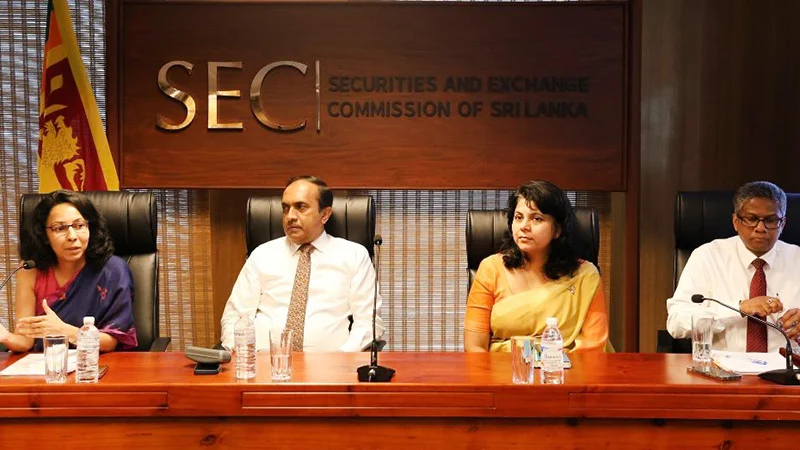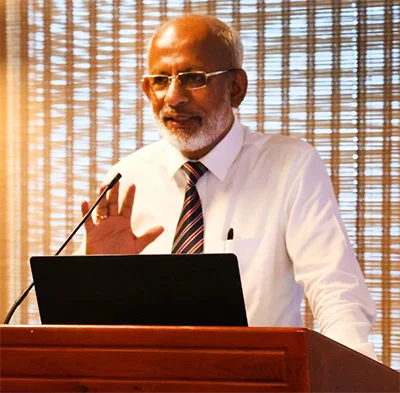Business
SLT-MOBITEL’s BizChat introduces FB Chatbot to support SMEs and micro businesses

SLT-MOBITEL, the National ICT, Telecommunications and Mobile Services Provider has enhanced its SLT-MOBITEL BizChat operation by introducing an exciting Facebook Chatbot, supporting Small and Medium Enterprises (SMEs) to ramp up their business operations on the social media platform, capitalising on the benefits of modern technology.
SLT-MOBITEL BizChat powered by artificial intelligence (AI), is an automated conversational experience, simulated through natural language that responds and engages with a large number of customer queries simultaneously. SLT-MOBITEL BizChat provides Sri Lankan companies a unique way to engage with customers on websites and on social media.
FB Chatbot as the latest addition to SLT-MOBITEL BizChat provides a smart solution and a novel method for small businesses to engage customers in the social media platform. While, installing the FB Chatbot is a simple process and includes copying a simple line of code and pasting it on the website, SLT-MOBITEL also provides installation services on request.
Importantly, placing FB Chatbot on the company’s Facebook page also ensures customers have direct access to intelligent interactions. Especially for smaller businesses that do not have a website, they receive the benefits of SLT-MOBITEL BizChat through a FB Chatbot as an ideal solution to optimise their online presence, meeting customer expectations and leveraging the power of social media.
Particularly during the pandemic where social distancing has become the new normal, and SMEs repeatedly endure setbacks, adopting a FB Chatbot is a valuable asset. The chatbot helps small businesses perform a range of key tasks including automating customer support, building brand awareness and even acquiring new customers through leads.
SLT-MOBITEL BizChat is of immense benefit to SMEs as it is an ideal solution to automate customer support and help desk conversations, and improve customer experiences with better service, speed and quality. With SLT-MOBITEL BizChat, SMEs can maintain customer interactions 24/7 and solve customer issues through automated replies. Incorporating this form of automation enables SMEs to focus on their core business, saving valuable time and resources.
Further information on the service may be obtained online via www.slt.lk/bizchat, by contacting 011 2389 389 or 070 500 4000 (WhatsApp only)
To ensure SMEs experience real-time tangible business results through the generation of new leads and sales, the SLT-MOBITEL Bizchat can be used on any device and, placed and optimized by professionals. By using the A/B testing process, the chatbot ensures the highest possible conversion rates compared to competitor bots.
A valuable feature of the SLT-MOBITEL Bizchat is that it is an excellent platform to build and capture brand awareness. It can support an SME’s brand awareness efforts by educating audiences and providing interactive experiences that are customer-orientated.
SLT-MOBITEL BizChat is a learning and self-updating chatbot that is able to manage multiple users at once. It offers a secure cloud-hosted chatbot service which ensures privacy and security for SMEs, easily configurable with the ability to create a chatbot in a few minutes and also comprises a user-friendly approach to content.
Helping SMEs adapt to the digital world, SLT-MOBITEL BizChat comprises enterprise level out of the box features. These include the capacity to build seamless conversational interactive forms to gather and capture customer information, a chat based search, natural language processing, answer training, payments, and subscriptions. The facility to directly integrate with CRM platforms and also Facebook integration are other key benefits offered to SMEs through SLT-MOBITEL BizChat.
Leveraging advances in technology, SLT-MOBITEL BizChat is able to provide support to a range of organisations including hotels, private hospitals, online retailers, educational institutions, distributors, stores, supermarkets and real estate companies etc., helping them exceed rising expectations of customers and achieve greater success.
Business
SL confronting ‘decisive test of fiscal discipline’

Sri Lanka enters the new year confronting a familiar but deepening economic strain, with falling foreign reserves, a weakening rupee, rising public debt and mounting disaster-related losses posing what analysts describe as a decisive test of fiscal discipline and policy coherence.
Sri Lanka Human Rights Centre Executive Director and former Provincial Governor Ranjith Keerthi Tennakoon has warned that the country urgently requires a coordinated economic response to prevent further deterioration, particularly as the cost of post-disaster reconstruction threatens to exert fresh pressure on already strained public finances.
“While the government has succeeded in revenue augmentation through heavy taxation and repeated increases in electricity and gas tariffs, its performance in maintaining fiscal discipline remains weak,” Tennakoon said in an economic indicators statement issued on January 5.
According to figures cited by Tennakoon, Sri Lanka’s domestic debt stood at Rs. 17,595.05 billion when President Anura Kumara Dissanayake assumed office. By the end of September 2025, that figure had climbed to Rs. 18,701.46 billion, reflecting an increase of Rs. 1,106.41 billion within a year.
External debt has also trended upward. From Rs. 10,429.04 billion at the end of 2024, foreign debt rose to Rs. 10,974.34 billion by September 2025. As a result, Sri Lanka’s total public debt stock now stands at Rs. 29,675.81 billion, underscoring the scale of the country’s fiscal exposure.
“This trajectory raises serious concerns about long-term debt sustainability,” Tennakoon warned, noting that debt servicing costs will intensify further if currency depreciation continues.
Foreign reserves under pressure
The steady decline in foreign reserves remains one of the most critical challenges facing the economy. Gross official reserves fell from USD 6,531 million in March 2025 to USD 6,033 million by the end of November, a contraction of nearly USD 500 million.
Tennakoon cautioned that upcoming reconstruction needs following widespread floods and landslides will necessitate substantial imports of construction materials, machinery and industrial inputs, inevitably drawing down scarce foreign exchange reserves.
Although Sri Lanka managed to maintain a current account surplus in 2024, the balance slipped back into deficit during September and October 2025, before returning to surplus in November. While a surplus is not required at all times, Tennakoon said the November turnaround offered a “cautious but positive signal” regarding the economy’s direction.
The rupee’s depreciation continues to amplify macroeconomic risks. The exchange rate has weakened from Rs. 293.25 per US dollar last year to around Rs. 309.45, increasing the rupee cost of foreign debt servicing while driving up import and production costs.
More troubling, Tennakoon noted, is the widening gap between commercial bank exchange rates and the informal undiyal (black market) rate, reflecting growing uncertainty and eroding confidence.
“This was precisely how the 2021–2022 economic crisis began — with a widening divergence between official and informal exchange rates,” he warned.
The economic fallout from recent floods and landslides adds another layer of urgency. Tennakoon criticised the government for failing, thus far, to prepare a comprehensive estimate of financial losses and reconstruction costs.
Preliminary assessments by the World Bank estimate disaster-related losses at USD 4 billion, while the International Labour Organization (ILO) places the figure as high as USD 16 billion, equivalent to 16 percent of GDP.
“Massive tax resources will be required for relief payments, while reconstruction will demand substantial foreign exchange for imports,” Tennakoon said, stressing that the government must urgently prepare credible financial assessments to mobilise both domestic and international support.
He also warned that delays in providing adequate relief have already become a serious concern for displaced communities struggling to rebuild their lives.
By Ifham Nizam
Business
Driving Growth: SEC and CSE collaborate to expedite listings

The Securities and Exchange Commission of Sri Lanka (SEC) in collaboration with the Colombo Stock Exchange (CSE) conducted an awareness session for Corporate Finance Advisors focusing on enhancing regulatory compliance and streamlining the listing process.
The forum brought together Corporate Finance Advisors and senior officials from the SEC and CSE to enhance the listing process by addressing regulatory expectations, identifying prevalent shortcomings in applications, and establishing best practices to strengthen investor confidence and market integrity.
Addressing the participants, Senior Prof. D.B.P.H. Dissabandara, Chairman, SEC highlighted the vital role Corporate Finance Advisors play in building market confidence beyond their traditional functions in facilitating listings, mergers, and acquisitions.
“Your screening process, your due diligence supports market confidence directly in addition to your key major roles,” the Chairman stated. “As a regulator, our main job is to look at investor confidence plus investor protection. And indirectly your job facilitates that as well.”
The Chairman emphasized that the overall reputation of the Sri Lankan capital market depends on the professional judgment and performance of Corporate Finance Advisors, as investors make decisions based on their assessments and recommendations.

Senior Prof. D.B.P.H. Dissabandara
Reinforcing this message, Mr. Rajeeva Bandaranaike, Chief Executive Officer, CSE emphasized the importance of collaboration in improving market efficiency. “The objective is to completely revamp and improve the overall listing experience for companies and issuers,” he stated. “This is a journey that we need to go together with the community. We cannot do this alone.”
He also noted the complexity of public listings compared to bank financing, explaining that heightened scrutiny is necessary when dealing with public money. “At the end of the day, if the prospectus is not clean and accurate, we’re going to face problems. We don’t want companies going into the watchlist after one or two months of listing.”
Building on this framework, Ms. Kanishka Munasinghe, Vice President, Listing, CSE highlighted critical gaps in recent listing applications, particularly regarding litigation disclosure and legal due diligence. The CSE has expanded its disclosure requirements to cover not just financial impact but also operational continuity and licensing implications.
Business
nVentures leads US $200K seed round into Flash Health to scale cashless outpatient care in Sri Lanka

Flash Health, a Sri Lankan healthtech startup building cashless, on-demand outpatient care, has raised a US $200,000 seed round led by nVentures, with participation from angel investors across Sri Lanka, Singapore, and the United States.
The funding comes as Flash Health expands its footprint across insurers, large employers, and healthcare providers, positioning itself as one of the country’s most widely adopted digital outpatient platforms addressing everyday healthcare needs.
At the core of Flash Health’s offering is Cashless OPD, which allows employees and policyholders to access doctor consultations, medicines, diagnostics, and telemedicine services without paying out of pocket, removing upfront payments and simplifying access to address a long-standing friction point in everyday healthcare across emerging markets. The platform’s approach has also received global recognition, with Cashless OPD winning at the World Summit Awards, an UN-backed platform recognising startups advancing the Sustainable Development Goals, selected from over 900 applications across 143 countries. Commenting on the investment, Chalinda Abeykoon, Managing Partner at nVentures, said, “We first met Arshad and the Flash Health team in late 2023 and were immediately struck by their ethos, attention to detail, and culture of excellence. As we worked with the team to fine-tune their product roadmap and execution, we saw a team that listens, iterates, and delivers. Flash Health is now operating at real scale, which made this a clear investment decision for us.”
Flash Health’s growth has been driven by partnerships with leading insurance providers, including AIA, HNB Assurance, Janashakthi Insurance, and Union Assurance, enabling policyholders to access services such as medicine delivery, home lab testing, telemedicine consultations, and wellness incentives through integrated digital workflows.
-

 News1 day ago
News1 day agoBroad support emerges for Faiszer’s sweeping proposals on long- delayed divorce and personal law reforms
-

 News2 days ago
News2 days agoPrivate airline crew member nabbed with contraband gold
-

 News1 day ago
News1 day agoInterception of SL fishing craft by Seychelles: Trawler owners demand international investigation
-

 News4 days ago
News4 days agoHealth Minister sends letter of demand for one billion rupees in damages
-

 Opinion6 days ago
Opinion6 days agoRemembering Douglas Devananda on New Year’s Day 2026
-

 Features2 days ago
Features2 days agoPharmaceuticals, deaths, and work ethics
-

 News1 day ago
News1 day agoUS raid on Venezuela violation of UN Charter and intl. law: Govt.
-

 Features1 day ago
Features1 day agoEducational reforms under the NPP government













